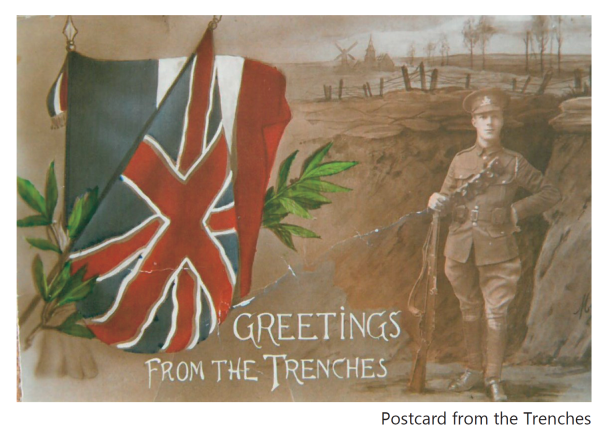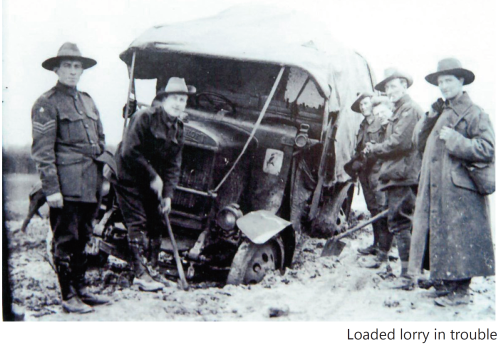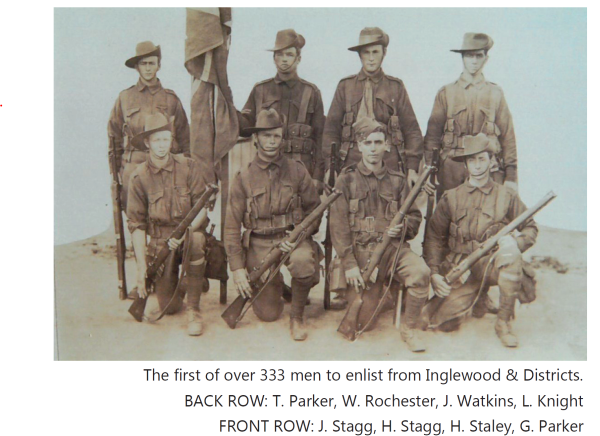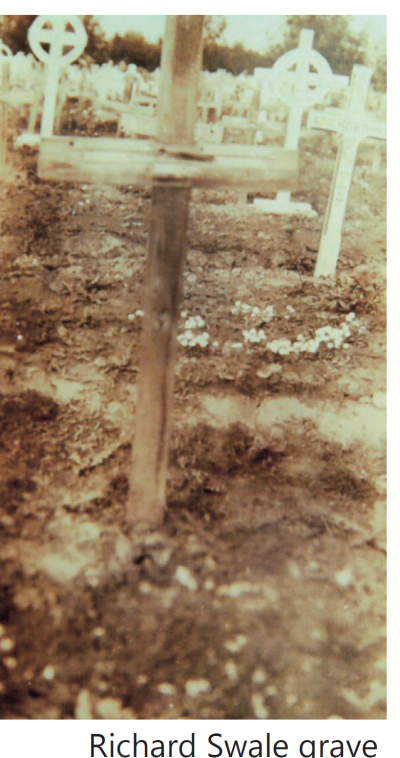INGLEWOOD TIDINGS FROM THE FRONT - WW1
A selection of items. Extracts from the Inglewood Advertiser 1914 - 1915

1914
Tue Aug 11, 1914:
At the sale yards on Thursday, 20th inst., Thomas Morrow and Co., instructed by Mr R.F.
Dawson, who is leaving for the war, will submit to auction in two lots 25 acres of freehold land adjoining
the Public Park.
Tue Aug 18, 1914:
Messrs A.W. Rochester and F. Dawson, of Inglewood, and G. Wylie, C. Sweeney, A.
Stephenson, J. Fullager and A. Cummins, [sic] of Bridgewater, who were among those to volunteer for
service in the expeditionary force about to be despatched to the seat of war, were successful in passing
the medical examination held last week, and leave this morning to go into camp. All have had training,
and three, Messrs Wylie, Rochester and Dawson, have held positions as non-commissioned officers, Mr
Wylie having occupied the position of lieutenant.
Fri Aug 21, 1914: District Patriotism MEN VOLUNTEER FOR SERVICE
As was the case when need previously arose, Inglewood has in the present crisis been in no way
behind other centres in providing soldiers ready to shoulder arms and sally forth in defence of the
Empire. The "war fever" was at first quietened by the announcement that trained men only would be
accepted to serve on the force, but since that has been altered each day has seen a fresh batch of
applicants leaving for Bendigo to undergo the medical examination which was necessary to secure their
inclusion in the expeditionary force. Very few were rejected, and consequently the contingent about to
leave for the Motherland will include a good representation from Inglewood and district. Bridgewater
has also shown unstinted loyalty, and from the two places at least 20 volunteers have been chosen.
Owing to the hurried and irregular nature of their departure, nothing in the way of a public leave-taking
was possible, but it has now become a common sight to see subdued groups of relatives and intimate
friends assembling at the station to bid farewell to those about to enter on the long journey. The
volunteers leave with the hearty good wishes of all, and the hope that, if they are called upon to take the
field, they will emerge from the ordeal with credit and unscathed.
The names of those who have so far left for camp from Inglewood are - Messrs A.W. Rochester,
F.H. Symonds, G. Parker, T. Parker, H. Stagg, A. Forrester, J. Stagg, H. Staley, J. Watkins and L.
Knight. F. Dawson will leave this afternoon. Among the successful Bridgewater volunteers are:- Messrs
G. Wylie, C. Sweeney, C. Samers, A. Stephenson, J. Fillager [sic – J. Fullager], A. Cummins [sic – A.
Cumming], Wodetzki, Butterworth and Beechley [sic - Beachley]
gathered to farewell any of their soldiers, as

1915
April 2, 1915
Bridgewater Soldier Farewelled PRIVATE A. [sic] LUCAS HONORED.
It has been the bad fortune of the Bridgewater public in the past that, owing to the hurried
departure of their soldiers, they have been unable to entertain them before leaving and, in a concerted
manner, express their appreciation of their patriotic action in volunteering. The opportunity offered on
Tuesday evening, however, and, despite the shortness of notice, there was an excellent gathering at the
Mechanics’ Institute to bid farewell to Private J. Lucas, one of the town’s most recent recruits. Mr J.
Scholes presided, and a very enjoyable evening resulted.
The toast of “The King, coupled with the rulers of France, Belgium and Russia,” proposed by the
chairman, was heartily honoured.
The toast of “Our Guest” was then proposed by Mr C. Burge amidst much enthusiasm. Mr Burge
stated it was the first occasion on which they had previously
the men had left too hurriedly to make any public leave-taking possible. They had, of course, marched
to the station with one batch of their men, and he thought this would be one of the most historic of
Bridgewater happenings. (Applause) Their guest had gone to school with many of them in his boyhood,
and lived with them all his life. He was known to all, and all felt proud that he was going to do his duty
to the King and his country – the British nation and the Australian Empire, which was rising nation wards.
He (the speaker) was certain he would reflect credit on Australia and the Bridgewater people, and he
wished him health, honour and a safe return. (Applause)
The toast was accorded musical honours.
Private Lucas, in response, stated he was in a tight corner, but as he supposed he would be in
tighter ones still before he had finished, he supposed he had better make the best of this one. He was
proud of his mission (cheers) and hoped to be able to keep his end up with the rest of the boys. He
wouuld do his best. (Applause) He was not going to say he was going to fight and die, but that he was
going to fight and live, as one live man was worth an army of dead ‘uns. (Applause) He would do his
best, and hoped to return, when the war was over, with all the others who had left Bridgewater.
(Applause)
Song, Mr V. Pacholli.
The toast of “The Expeditionary Forces, coupled with the names of local volunteers” was
proposed by Mr Webster, who stated that his only drawback was that he could not find sufficient word
to express himself adequately. He was sure it must be a pleasure for any man to swell the ranks of what
the Kaiser had termed “England’s contemptible little army.” (Applause) This term, together with that
well-known phrase, “a scrap of paper,” would go down to posterity. He was sure the expeditionary
forces abroad and those in training at Broadmeadows would keep up the traditions of their race, and
they could pat themselves on the back as being the leading race, because it was to Britain that the whole
world turned for guidance and protection in time of war. (Applause) He was certain their
representatives would do their duty faithfully and well, and that their names would be handed down to
future generations clothed in honour and glory. He asked them to drink to the health, success and safe
return of the soldiers who were going forth to fight for the liberty of the world. (Applause)]
The toast was enthusiastically honoured, Mr W. Pacholli then favouring the assemblage with a
song.
The chairman then, on behalf of those present and other subscribers, presented Private Lucas
with a wristlet watch as a token to remind him of his Bridgewater friends. Bridgewater had already
contributed over 20 young men to the forces, and within the next few days the number would be
increased to 26. This was very good indeed, considering their population was not more than 300. He
was proud to be bidding farewell to an old friend on such an occasion, and, as a brother to a soldier
already in Egypt, he trusted he would always do his duty, come what might. (Applause) If a younger
man, he himself would feel it his duty to go, as he considered the ambition to fight for his country at a
time like this was the grandest any man could have. (Applause) He had known and been associated
with their guest since his boyhood days. As boys they had fought, as boys will, but as men they had
been good friends. (Applause) He trusted Private Lucas would wear his watch, not long in Europe, but
for many years after his return, and that it would serve to remind him at all times of his many friends at
home. He trusted that when the shame inflicted on the Belgians had been fully avenged, and the Kaiser
had been made to realise that the despised “scrap of Paper” was of paramount importance, their guest,
with all who had left, would return to them safely. (Applause) He could say they would give them a
right good British welcome home. (Hear, hear)
Mr V. Pacholli supported and spoke of the high character of the guest. He was going to fight for
Australia and them, and they hoped and trusted he would return safely.
Private Lucas stated he would value the present highly. He trusted that the watch would be in
the first ranks of the first battalion that reached Berlin, and that it would return in good going order.
(Applause)
Private Lucas was entrusted with watches for delivery to Privates F. Wigmore and R. Taylor at
Broadmeadows, the opportunity for presenting them at Bridgewater not having been afforded.
Song Mr W. Pacholli.
Mr V. Pacholli suggested the presentation of a watch to Mr C. Baker, who, although not long
out from England, was yet animated by the same spirit as their own boys and was going to fight for the
same object as they were. Although Mr Baker would not return to Australia at the end of the war he (the
speaker) thought he should be treated as the others were.
The chairman replied that, with the funds held by Mr Webster, a present would be purchased as
suggested. There would be more watches to be purchased before long, as the patriotic feeling was
growing.
The playing of Auld Lang Syne and the National Anthem by the band brought the evening to a
close.
~
Fri June 11, 1915:
Private Arthur J. Stephenson, who was reported wounded at the Dardanelles, was a farmer, of
Memsie, near Bridgewater. He was born at Malmsbury, and 23 years of age. For three years he was a
member of the Inglewood Rangers, and one of the first 20 to volunteer from the district. He is the
second son of Mr A.H. Stephenson, farmer, of Memsie, and a brother to the Rev P.W. Stephenson, M.A.,
late of Ridley College, Melbourne, but now of Edward College, Peshawur, India.
Inglewood Soldier Killed PRIVATE KEITH AUSTIN
Mrs Austin, of Market Street, has been called upon during the last few days to display as great
fortitude as that which old Spartan mothers were credited with possessing. She sent three sons to the
war, Ray, Errol and Keith, all boys just on the threshold of manhood. Some short time ago she received
word that Ray - always physically robust - had been invalided home as constitutionally unfit for service.
On Thursday last she was notified that Errol had been wounded in action at the Dardanelles, while as the
heaviest blow of all, last Saturday the sad news that Keith, her youngest son, had been killed was
conveyed by the Defence Department to Rev A. Ditterich, upon whom devolved the painful duty of
making this dreaded calamity known to the widowed parent. Prostrated with the succession of blows,
Mrs Austin had to bow to the inevitable.
The sad news cast a deep gloom over the entire town. Flags were hoisted at half-mast, while
everywhere was evidenced and expressed a deep feeling of sympathy with the mother. The heart-felt
regret of residents generally was conveyed to Mrs Austin by the Mayor.
The young soldier was but 19 years of age, but early in the war became actuated by a fervent
desire to enlist. At the time he was one of the staff of the "Advertiser" office, and, although bound for
several years' service, the proprietor, rather than thwart his desire, consented to his indentures being
cancelled. He was a bright, well-behaved and promising lad, and was generally highly esteemed.
Cheerfulness, always displayed, and a keen interest in all things appertaining to his work were
outstanding characteristics, and an ambition to serve the interests of his employer at all times made his
services valuable. He took a keen interest in all local doings affecting the young men of his age, and was
a member of last year's second-rate football club. As a mark of respect to his memory the Inglewood
club on Saturday took the field at Arnold with crepe arm-bands.
Tue Nov 9, 1915:
Tidings of the Soldiers
Corporal R. Millar and Private R.T. Millar, of the Signallers' Corps, are visiting their home on
final leave. Private E. Kittson, of the same corps, is spending his leave in the metropolis.
Corporal E. Jennings and Privates M. Dewhurst, J. Thomas, T. Richardson and C. Radnell
visited their homes at the weekend. Private Dewhurst was, we understand, on final leave.
On Friday last 2400 members of the 8th Brigade, which is under the command of Colonel E.
Tivey, marched through Melbourne. The excellent appearance of the troops evoked the admiration of
spectators, and Colonel Tivey was highly complimented upon the efficiency of his command.
Captain E. Tatchell, formerly of Inglewood, has been placed in charge of a remount unit of 800
men.
Lieutenant H. Wright writes to the effect that he is fast regaining physical fitness, and will
shortly be returning to the front.
Private E.B. Symonds, one of the few members of the first contingent to go through the
fighting unscathed, states that he is at present enjoying a well-earned rest from hostilities.
Mrs O'Keefe, of Glenalbyn, has been informed by the Defence Department that her son, Private
H. O'Keefe, has been invalided to England, and is at present in hospital at Portsmouth. Private O'Keefe
was among the first soldiers to volunteer from the district, and his many friends will wish him a speedy
and complete recovery.
Historic Lonesome Pine
FALLS BEFORE SAPPERS
A PIECE REACHES VICTORIA
Authentic information has reached Melbourne that the historic lonesome pine tree on the ridge
on which the Australians fought so gallantly in Gallipoli, has fallen before the sapper.
A piece of it, three inches in diameter, and an inch and a half in depth, has reached Melbourne,
and is in the temporary custody of Colonel W.M. Reeve, head of the Beechworth Occupation Branch of
the Lands Department, who is uncle of the sender, Captain A.R. Wiltshire, Adjutant of the 22nd Batt of
the 6th Infantry Brigade.
Captain Wiltshire, a son of the late Rev A.R. Wiltshire, who was accidentally killed at Euroa seven
years ago, and Mrs Wiltshire, of Airlie Avenue, Armadale, asked his uncle to keep the precious piece of
wood for him, and Colonel Reeve says that he will guard it safely as an inspiring relic of a wonderful
charge.
~
From the Korong Vale News
Tue Oct 30, 1917:
KORONG VALE NEWS
Killed In Action.
The receipt of the news during the past week that Capt. Jack Eddy, of the Australian Field
Artillery, had been killed in action on the 4th inst., recalled sad memories to the older residents of this
town. The deceased officer was the oldest son of Major Geo. Albert Eddy, who commanded the first
Victorian contingent to the Sth African war, and who was killed in action while leading his command
against the Boers at Pink Hill, on the 12th February, 1900. At the time of his father’s death the late Capt
Eddy then a very small boy, was living in Korong Vale with his Aunt, Miss Wilson, Postmistress at the
local post office, and following the sad occurance, Jack naturally became a favorite with the
townspeople. Later he was educated at Wesley college, and the Military college at Duntroon, where he
was a college mate of the late Lieut. W. Dawkins, formerly of Korong Vale, who was killed at Gallipoli,
from where both men secured their commission. Capt Eddy offered his services the first day volunteers
were called for in Australia. Before reaching his manhood he developed a splendid physique, standing
six feet two inches in height, and as yet was only in his 24th year.
Sergt. Ronnie O’Brien Killed.
Mrs O’Brien received word from the Defence department on Monday that her son Ronnie was
killed in action in France during the month. No details of his death were given. A fuller account will
appear next week.
DEATH ON ACTIVE SERVICE.
BIRD – Killed in action in Polygon Wood, West Flanders, on the 26th September, 1917, David, Lewis
Machine Guns, 59th Battalion, A.I.F., the ever dearly and truly beloved husband of Agnes M. Bird, Brooke
Street, Inglewood. Aged 32 years 4 months.
He was my all.
- Inserted by his devoted wife.
BIRD - Killed in action in Polygon Wood, West Flanders, on the 26th September, 1917, David, Lewis
Machine Guns, 59th Battalion, A.I.F., the beloved son-in-law and brother-in-law of Mr and Mrs Shepherd,
Frank (killed in action, 15th July 1916), Arch (A.I.F., over 1000 days), Don (rejected), and Cecil. Aged 32
years 4 months. Formerly in charge of Rainbow police station.
A Moliagul correspondent writes: - A social was held in the Moliagul hall last Friday night to
welcome home another of our war-worn heroes, in the person of Private T. Liddle, who was born here,
but is now living in Melbourne with his wife and family. Notwithstanding the dark and wet night there
was a fair gathering, including people from Goldsborough, Dunnolly and other places. Mr C. Brookes
presided. It had been intended to make a presentation of a gold medal, but unfortunately Private Liddell
by some means had missed the train from Melbourne to Dunnolly. I understand the committee will
send the medal to him. However, the social was kept up to a late hour with various performances.
In Honor’s Cause.
PTE J.J. O’BRIEN KILLED IN ACTION.
Mr F.L. O’Brien, of Strickland road, Bendigo, received the sad news through the Rev. Mr Gurnett
that his second eldest son, Private J.J. O’Brien, 57th Batt., aged 36 years, has been killed in action on 27th
September while fighting in France. The late Private O’Brien fought in the Boer war, and enlisted in
Bendigo in July, 1915, and embarked on 28th January 1916. The sad news will come as a great shock to
his many friends in Mystic Park and Glenalbyn, where the deceased soldier was very popular, and where
he resided up to the time of enlisting. Much sympathy is felt for the bereaved father and family, as only
on Saturday of last week they received news that their youngest son, Private E.C. O’Brien, had been
admitted to the Southern General Hospital, Plymouth, suffering from gunshot wounds. Private E.C.
O’Brien enlisted the same day as his brother. Another brother, Private George O’Brien, is also on active
service. Mr F.W. O’Brien, of the Kurting railway station, is a brother to the above soldiers.
PTE W.R. McNICOL WOUNDED.
Mr W. McNicol, of Korong Vale, was informed by the Defence department on Friday that his
eldest son, Private W.R. McNicol, had been reported admitted on 5th October to the 10th Stationary
Hospital, St Omer, France, suffering from gunshot wound in the right shoulder, arm, back and face
(dangerous).
PTE W. WATTS WOUNDED.
Mr W. Watts, of Bridgewater, has received news that his son, Private W. Watts, has been
wounded whilst fighting in France. Private Watts sailed with the 57th Battalion, and has been in the
trenches for seven months. That the soldier may soon recover from his wounds will be the wish of all.
BRIGADIER-GENERAL E. TIVEY WOUNDED.
Word was received on Saturday that Brigadier-General E. Tivey, C.B., D.S.O., had been wounded
in action in France. The injury is a bullet wound in the arm, and it is a matter for congratulation that it
is not more serious. All will wish that the distinguished soldier may speedily recover in order that the
forces under his command may not be long deprived of the benefits of his direction.
Fri Dec 29, 1916:
An Epic from Egypt.
The following lines, originally printed in “London Opinion” have been forwarded by a
district soldier stationed in Egypt:-
It ain’t no use a –swearin’,
It ain’t no good to fret,
There’s little gained by grousin’
Or getting’ all upset.
This wilderness is rotten,
All flies and dust and tears,
But the Israelites they stuck it
For years and years and years.
The Willie-Willies choke yer,
The dust storms get yer down;
The red sun robs yer beauty,
And turns yer black and brown.
The drought is something shocking;
The thirst, our squadron fears,
Can only be abolished
By beers and beers and beers.
But war won’t last for ever,
This scrap’ll soon be done,
And we’ll have done our little bit
A-strafing o’ the Hun.
And when we get back home again,
An’ meet our little dears,
All thought of Egypt will be drowned
In cheers and cheers and cheers.
~
Come and explore Inglewood in the Loddon Mallee. Just 50km NW or Bendigo. www.inglewood.vic.au

